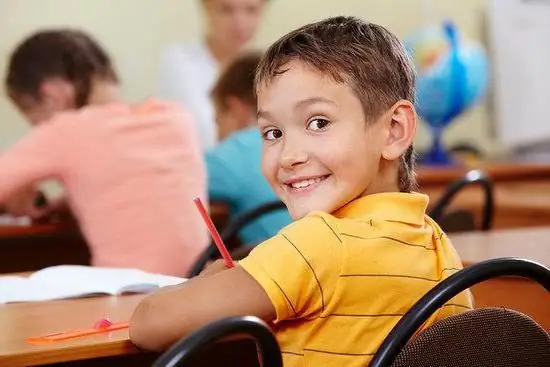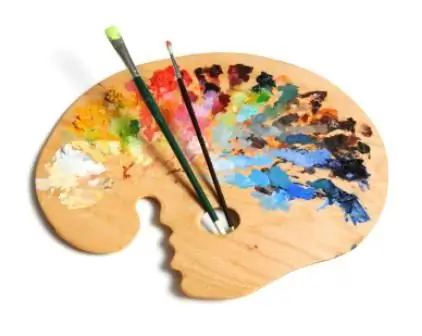2026 Author: Priscilla Miln | miln@babymagazinclub.com. Last modified: 2025-06-01 05:14:29
Children are the most kind, sincere and unspoiled people on Earth. At the same time, they are also extremely wise, as for their young age, and most often this wisdom manifests itself during conversations. Funny phrases of children delight parents, grandparents, many of them have become real aphorisms and are used in everyday life even by adults.
Usually mothers and fathers easily find a common language with their child, it is not difficult for them to understand what exactly the baby is saying, because they are used to his funny words. But to relatives who rarely see the child, and to strangers, all his phrases may seem like just an incoherent set of sounds. Today we invite all adult readers to remember the long-forgotten children's language, laugh a little at the funny expressions of babies, and also figure out in which cases the child needs help to start speaking correctly.

"Baby language" - how to understand it?
In the first years of life, the child talks in his own way. This happens because speech for him is somethingnew and not fully understood. From about three to four months old, babies begin to gurgle, coo, they manage to pronounce simple syllables like “ta-ta”, “ka-ka”, “ma-ma”. However, only by eight or nine months will the child put any meaning into these simple sounds.
The process of learning speech in children is very active and fast, by the year they usually know and actively use 10-20 simple words. And it is at this time that the funny phrases of children begin to amuse everyone around. It is not worth hoping to understand them for an adult who does not live with a particular child all the time. The maximum that he can make out is the generally accepted "baby" words like "yes", "no", "mom", "dad" and "aw-aw". But everything else the baby speaks in his own way, since his speech apparatus and phonetic perception of sounds are not fully developed. Moreover, children seem to be trying to pronounce the words for adults correctly, but still they rarely succeed, because their tongue is not mobile enough, the bite is not yet formed and the lungs are poorly developed.

When do babies start talking?
At about two years old, babies learn speech at a sufficient level to express themselves in short sentences. Children's language at this age is very amusing, because young speakers do not pronounce many sounds, replace them, or completely miss them. Because of this, they get various hilarious words:
- carriage - kayak;
- dog - babaka;
- milk - mako;
- grandma - buska;
- porridge - porridge;
- apple - apple, etc.e.
As a result, when a child tries to say a sentence consisting of several words, very funny phrases come out. Children are sometimes even misunderstood, because adults put their own meaning into what they say. For example, a child says: “I am going with my mother to sour vodka to grandfather”, and a loving grandson will not actually drink “fettered” with his grandfather, he will simply help him paint the boat.

Cheat sheet for adults
Of course, every baby talks differently, but for some reason, all babies make the same “mistakes” when they talk at an early age. So, everyone understands that if a child says “ka-ka”, it means that he found dirt or garbage, and when he says “meow” or “kit-kit”, he most likely means a cat, but doesn't call him. The same applies to other animals, birds and things or objects around the baby:
- mu-mu is a cow;
- av-av - dog;
- kar-kar - crow;
- broom-broom and bibika - machine;
- bang - something fell;
- vava - wound;
- ale - telephone.
Basically, all these phrases are imposed on children by adults themselves, trying to explain to the child as simply as possible what and how it is called. But among the little words there are those that cannot be logically explained or “translated” like that right away. That's one of the adults who can guess that the budeyka is a tomato, nonya is a telephone, buguka is a pillow, and konka is pasta. These are exactly those funny phrases of children that need to be written down in a separate notebook, because the baby will soon improve, and his sweetheartchatter will be forgotten.
With age, a child's speech transforms and becomes more complex. He can still distort phrases consisting of several syllables, but he pronounces short phrases correctly by the age of three or four. The smartest children at this age can also handle the pronunciation of fairly complex words and even whole sentences.

Unchildish wisdom
Older children amuse adults not so much with mistakes in speech as with their statements. Sometimes a phrase worthy of a thinker, whitened with noble gray hair, may sound from the mouth of a child. Smart children instantly recognize lies and present everything as it is, without cunning and tricks.
Here are just a few life stories in which babies demonstrate their intelligence and logic:
- In kindergarten girls show off their outfits. A boy enters the group, listens to the conversations of his girlfriends and says: “Oh, girls … Beads, bows, tights - women! How I love you!”
- Child sorting out a gift of candy: this one is bear-flavored, this one is squirrels, and this one is Little Red Riding Hood…
- Granny's stomach was seized, and her granddaughter found out about it, to which she advised her relative to drink "animal" pills.
Such life situations do not happen every day, so if a child has already given out another pearl, it must be recorded!

Boneless tongue
Older kids can talk all day long. They endlessly ask their parents questions, and they themselves are not aversetell a lot of stories, both fictional and quite real. If the child speaks without stopping, then he is liberated and sociable. You should not close his mouth, even if he sometimes puts his parents in an awkward position. It is better to teach the child in what situations it is necessary to keep his mouth shut, but you should not force him to be silent all the time.
This can negatively affect his psyche and development. Feeling that he is not being listened to or heard, the child withdraws into himself or goes to seek communication outside the home, both of which alienate him from his relatives.
The deadline for the development of speech in children. How to stimulate your child's speaking skills?
Scientists have proven that a person can be taught to speak up to a maximum of five years. After that, the speech centers in the brain close, and the child no longer understands how to speak.
Therefore, if by about two years old the baby has no progress in the oratorical field, it is worth showing it to specialists. After four years, an interpreter from a child's language to an adult is not needed, kids should already learn to speak correctly, have enough vocabulary to communicate freely with everyone around them.

Examination must be comprehensive:
- an otolaryngologist will assess how well a child has developed hearing;
- dentist checks bite;
- speech therapist-defectologist - the ability to correctly use the speech apparatus;
- neurologist - will identify problems with the nervous system, indicate the general level of development of the child, correlate the receivedindicators with average norms;
- psychologist - will assess the psychological balance of the baby.
In order for the child to speak faster, you need to constantly conduct a dialogue with him. At the same time, it is extremely important not to lisp with him and correct existing speech errors. It is important not to limit the communication of the baby with other children, and it has a great effect on the ability to talk pastime with older children.
Cute but still wrong
Small children speak in a special way, they burr, lisp, distort words. All this seems cute and funny if the child is one or two years old, well, a maximum of three. If by this age the baby does not correct diction, he has significant speech defects, you should contact a speech therapist.
But working on the correct pronunciation is not only the task of a specialist in a training center or kindergarten, where a lot of responsibility for this process rests with the parents themselves. It is they who must systematically correct the child if he pronounces some words incorrectly, read with him, do articulation exercises, talk, discuss various images, learn poetry and sing rhythmic songs. All this has a great effect on the baby's speech, and also has a positive effect on his mood and self-confidence.

Why do kids talk funny?
First of all, because they don't know how to do it right from birth. At first, poor diction is solely the “fault” of the child’s physiology, but as the baby grows, all defects need to be corrected and in no waycase do not support them. No matter how funny dad may be, when the baby tries to pronounce words like "fishing", "work" or "pike", not being able to reproduce the letters "r" and "u", he is obliged to restrain emotions. A small person needs to be supported in his studies and directed his efforts in the right direction. Children say funny words not on purpose, they do it involuntarily, and if loved ones make fun of them about this, they can only make things worse. Mistakes should be corrected gently and tactfully, but constantly.
When should children's "abracadabra" alert?
As we have already said, starting from the age of two, it is worth showing interest in how the child talks and try not to let the delay in his speech development take its course. Speech therapists distinguish two types of vocabulary in children. Active, this is when the baby understands and speaks everything, repeats unfamiliar words after adults. In this case, there is nothing to worry about the baby's speech.
The second version of the norm is a passive vocabulary. This term is applicable to children who respond to the requests of adults, carry out their instructions, they understand everything, know what the object is called and what it is for, but at the same time they do not speak at all or practically do not say anything except “mom”, “dad”. ' or 'yes' and 'no'. As a rule, such kids will not even speak funny and incorrectly, they will immediately begin to pronounce folding sentences, and quite competently, but when they grow up to 3-4 years old.
But if the child is non-contact, he does not respond to calls, does not fulfill the requests of other people, then he hascertain he alth problems. They need to be addressed as soon as possible, since early correction of developmental delays gives the greatest results. The older the children, the more difficult it is for specialists to correct speech problems.
Recommended:
Identification and development of gifted children. Problems of gifted children. School for gifted children. Gifted children are

Who exactly should be considered gifted and what criteria should be followed, considering this or that child the most capable? How not to miss the talent? How to reveal the hidden potential of a child who is ahead of his peers in terms of his level of development, and how to organize work with such children?
Phrases pickup girls who cling. Pickup phrases are funny. Best Pickup Phrases

Pickup is the art of seduction. And although now the phrase "pickup master" is often used as a mockery and irony of an unfortunate boyfriend, this does not mean that sarcasm is the only answer to an attempt to seduce
What is leisure? Adult and children's leisure

Everyone in our time knows perfectly well what leisure is and what is characteristic of it. Therefore, in this article we will briefly consider the deep meaning of this term, as well as expand the ideas of many about how exactly this very leisure can be spent with the greatest benefit and benefit
Children do "it" - how to behave as an adult?

Preschool children often have common pathological habits, such as sucking toys, fingers, biting nails, masturbation (masturbation). A situation may arise when a parent finds a child playing with his genitals. The first reaction is shock, perhaps a desire to punish misbehavior
The language of cats. Cat language - translator. Meowing cat - how to understand?

A cat is an amazing creation of nature. No animal is so expressive in the manifestation of feelings as this beast. A cat conveys all its emotions, attitudes through facial expressions, body movements, sounds, eye expressions and smells

